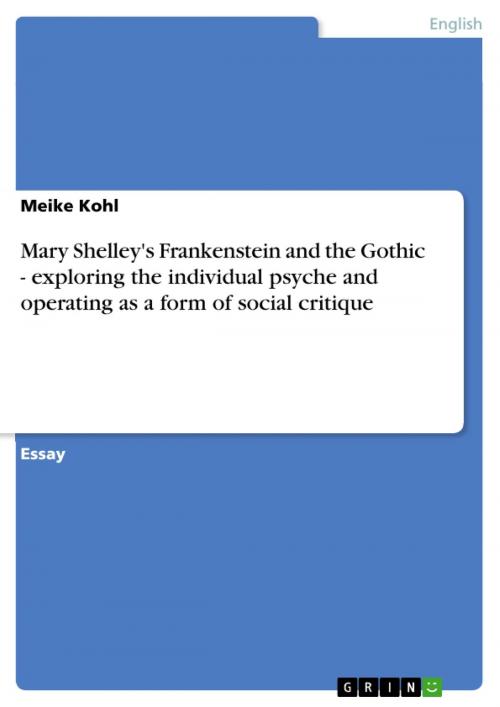Mary Shelley's Frankenstein and the Gothic - exploring the individual psyche and operating as a form of social critique
exploring the individual psyche and operating as a form of social critique
Fiction & Literature, Literary Theory & Criticism, British| Author: | Meike Kohl | ISBN: | 9783640200375 |
| Publisher: | GRIN Publishing | Publication: | October 30, 2008 |
| Imprint: | GRIN Publishing | Language: | English |
| Author: | Meike Kohl |
| ISBN: | 9783640200375 |
| Publisher: | GRIN Publishing |
| Publication: | October 30, 2008 |
| Imprint: | GRIN Publishing |
| Language: | English |
Essay from the year 2006 in the subject English Language and Literature Studies - Literature, grade: 1,3, Queen's University Belfast, 7 entries in the bibliography, language: English, abstract: The Gothic often employs a first person narrative focussing on the inner lives of its protagonists. The psychological processes revealed reflect political and social issues arising in the late eighteenth and early nineteenth century. The Enlightenment, French, American and Industrial revolution had set in motion a reshuffling of traditional social orders; a new middle class, the bourgeoisie emerged, and with it mercantilism and rationalism. The Gothic can be seen as a reaction to overtly rational thinking, exposing the hidden fears of that time, and criticising the new models of society. The core text used as a representative of the genre Gothic is Mary Shelley's Frankenstein. However, Frankenstein is not only a Gothic novel, but is closely connected to Romantic thoughts and ideas. Vice versa, some of the tropes of the Gothic novel can also be found in Romantic literature. Frankenstein is intertextually connected with Wordsworth´s and Coleridge's Lyrical Ballads through references to Coleridge's 'Rime of the Ancient Mariner' and Wordsworth´s 'Tintern Abbey'. Romantic poetry focuses on the individual, too. Although the form of novel and poetry inevitably differs, and thus also the extent to which a character or issue is presented, a lot of similarities can be found which stand for a discourse typical of that epoch. A prerequisite for the exploration of the individual mind is a narrative exposing the processes of the protagonist's mind. The suitable narrative form is thus the first person narrative employed in Mary Shelley's Frankenstein, as well as in some of the Lyrical Ballads. In a time of political and social upheaval very few things appear stable, and neither does the individual mind. Cultural and individual change is paralleling each other.
Essay from the year 2006 in the subject English Language and Literature Studies - Literature, grade: 1,3, Queen's University Belfast, 7 entries in the bibliography, language: English, abstract: The Gothic often employs a first person narrative focussing on the inner lives of its protagonists. The psychological processes revealed reflect political and social issues arising in the late eighteenth and early nineteenth century. The Enlightenment, French, American and Industrial revolution had set in motion a reshuffling of traditional social orders; a new middle class, the bourgeoisie emerged, and with it mercantilism and rationalism. The Gothic can be seen as a reaction to overtly rational thinking, exposing the hidden fears of that time, and criticising the new models of society. The core text used as a representative of the genre Gothic is Mary Shelley's Frankenstein. However, Frankenstein is not only a Gothic novel, but is closely connected to Romantic thoughts and ideas. Vice versa, some of the tropes of the Gothic novel can also be found in Romantic literature. Frankenstein is intertextually connected with Wordsworth´s and Coleridge's Lyrical Ballads through references to Coleridge's 'Rime of the Ancient Mariner' and Wordsworth´s 'Tintern Abbey'. Romantic poetry focuses on the individual, too. Although the form of novel and poetry inevitably differs, and thus also the extent to which a character or issue is presented, a lot of similarities can be found which stand for a discourse typical of that epoch. A prerequisite for the exploration of the individual mind is a narrative exposing the processes of the protagonist's mind. The suitable narrative form is thus the first person narrative employed in Mary Shelley's Frankenstein, as well as in some of the Lyrical Ballads. In a time of political and social upheaval very few things appear stable, and neither does the individual mind. Cultural and individual change is paralleling each other.















